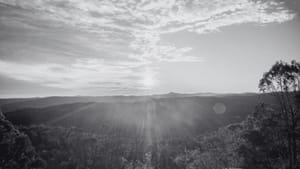Our word today is doubt.
I find it fascinating to delve into the layers of this word and understand its deeper meanings by exploring the origins of doubt, how it has evolved over time, and what it signifies in the realm of spiritual consciousness.
The Roots of Doubt
Doubt has intriguing origins that trace back to ancient languages and cultures. Doubt is connected to the Proto-Indo-European root *dwo-, which means two. This root is significant because Proto-Indo-European isn't a language found inscribed on tablets or written records; rather, it's a reconstructed language. Linguists have pieced it together based on their knowledge of both ancient and modern languages.
This root connects to some of the oldest languages known to humanity, including Sanskrit and Avestan. Avestan was the language used to write the earliest manuscripts in the region of Iran, formerly Persia. These manuscripts are associated with Zoroastrianism, one of the world's oldest religious traditions. Avestan is remarkably similar to Vedic Sanskrit, the language used in the oldest Vedic manuscripts of India.
The people who spoke Proto-Indo-European likely lived around the Caspian Sea and migrated both east and west. This migration spread their language and its roots across vast regions. For instance, the root *dwo- meaning two appears in European languages like Latin and Greek (as duo), which then influenced the Romance languages—French, Italian, and others. It also has connections to Germanic languages and even the ancient Hittite language, which was spoken in what is now southeastern Turkey.
From Duo to Doubt
Understanding that the root of doubt means two offers profound insights. Originally, doubt referred to being indecisive between two options. You might picture yourself at a crossroads, unsure whether to turn left or right. This is the essence of doubt in its earliest sense: uncertainty about a choice between two paths.
The English word doubt comes from the Old French word douter, which carried this very meaning. It wasn't until the 13th century that the concept of fear became entwined with doubt. Around the 1200s in French, doubt began to mean to dread or to be afraid. This shift introduced the modern idea of doubt as the fear of uncertainty.
The Evolution of Language and Consciousness
As verbal communication expanded, so did the concept of doubt. In ancient times, humans relied more on group consciousness and telepathy—a shared understanding without the need for words. With the development of language, people began to lose some of this innate connection. The emergence of individual consciousness brought about a sense of separation, and with it, fear.
Plus, the introduction of verbal language shifted humanity's individual or group experience. Before words, there was a deeper trust in the wisdom of the body and the collective. Language allowed for more complex thought but also introduced internal dialogues that could foster self-doubt. People began to question themselves and their choices more intensely.
The Mind, the Body, and Doubt
In part, the body processes experiences through cellular memory – through what is remembered or retained from previous experience. The body also processes through feeling, sensation, and intuitively understanding without needing words. The mind, however, tends to process experience consciously, often through internal dialogues and analysis. Both body and mind have unconscious components which influence conscious action and response. Neither is inherently better; both are essential aspects of human experience.
With the rise of verbal communication, there was a shift in how power dynamics played out within societies. Power Over as authoritarian dominance emerged, leading individuals to doubt their self-worth and dismiss their inner wisdom. Doubt, when influenced by fear, becomes an external force that can undermine the personal sense of self.
Doubt as Choice vs. Doubt as Fear
Energetically, doubt serves as the experience that initiates choice and discernment. Recognizing that you have options empowers decisions aligned with your true self. In this sense, doubt is a catalyst for growth and self-awareness.
However, when fear becomes attached to doubt, it shifts focus. Doubt influenced by fear can manifest as self-doubt or distrust of others and situations. It creates an internal conflict that hampers your ability to make clear choices.
Consider doubt without the mindless reaction of fear as an inside-out experience. It comes from within and leads you to explore possibilities. Doubt with the overwhelming influence of fear is generally an outside-in experience, where external pressures and anxieties influence your internal state.
The Impact of Societal Structures on Doubt
Societal structures and the emergence of hierarchical power dynamics have significantly impacted how doubt is experienced. The concept of Power Over thrives when individuals doubt themselves and their worth. By fostering self-doubt, those in power can maintain control.
Modern life often emphasizes external validation and encourages living outside-in. There's pressure to prove self-worth in the world, leading to a reliance on outside opinions rather than inner wisdom. This external focus can amplify fear-based doubt, distancing you from your authentic self.
Reconnecting with Inner Wisdom
Feeling odd or different is often a sign you're engaging with doubt as a choice rather than as fear. This sense of not quite fitting in can be a powerful indicator of your willingness to explore beyond societal expectations and reconnect with your inner truth.
Your inner urge to understand and seek deeper meanings reflects this dynamic. By moving away from fear-induced doubt, you embrace the freedom of believing in your inherent awesomeness. You acknowledge you are worthy just as you are.
Language as a Living Entity
Language is not static; it's a living entity that evolves over time. The word doubt itself has transformed through the centuries, influenced by cultural shifts and historical contexts.
Approximately 3000 years ago, as the human agreements shifted into a dominance of the mind and body over the heart and soul, fear became part of the newly emerging power dynamics.
In the 13th century, during significant societal changes in Europe, the negative connotations of doubt became more pronounced. This period saw the intensification away from of a shift from group consciousness to individual consciousness, aligning with the early stages of the Renaissance. This intensification introduced new challenges and altered how people perceived themselves and their choices.
The Loss and Rediscovery of Connection
As humanity moved towards both the dominance of Power Over and a deeper personal sense of the individual, the innate connections with body wisdom and heart awareness diminished. This loss led to increased reliance on the mind and a potential overemphasis on analytical thinking. The balance between mind and body wisdom became skewed.
However, in today's world, there's a growing interest in rediscovering these lost connections. Practices that promote mindfulness and spiritual awareness are becoming more prevalent. There's a recognition of the importance of integrating both the mind's analytical capabilities and the body's intuitive wisdom while incorporating the depth and understanding of heart and soul.
Navigating Doubt in Modern Times
Nowadays, doubt often arises amid information overload and constant external stimuli. The fear of making the wrong choice can be paralyzing. However, by understanding doubt's origins and its dual nature, you can transform your relationship with it.
Embracing doubt as an opportunity for choice empowers you. It allows you to pause, reflect, and make decisions that resonate with your authentic self. When you recognize doubt without attaching fear, you open yourself to expanded possibility and deeper personal growth.
Cultivating Self-Trust
Building self-trust is essential in navigating doubt. By tuning into your inner wisdom and acknowledging your worth, you reduce the influence of fear. This shift from external validation to internal assurance strengthens your ability to make confident choices.
You might find it helpful to engage in practices that foster self-awareness, such as connecting with your Akashic Records, meditation, journaling, or spending time in nature. These activities can help quiet the external noise and bring clarity to your inner voice.
The Power of Language and Thought
Understanding how language shapes thought is crucial. Words carry energy and influence how you perceive yourself and the world. By choosing words that empower rather than undermine, you can reshape your internal dialogue.
Consider reframing your thoughts when you encounter doubt. Instead of viewing it as a barrier, see it as a signpost indicating a moment for discernment. This positive reframing can reduce fear and encourage proactive decision-making.
Connecting with Others
While individual consciousness has its benefits, humans are inherently social beings. Reconnecting with others on a deeper level can alleviate feelings of isolation which often accompany fear-based doubt.
Seek out communities or groups that share your interests and values. Engage in meaningful conversations and collaborative activities to restore a sense of shared wisdom and support.
Embracing the Journey
Your exploration of doubt is part of a larger journey into spiritual consciousness. By delving into the word's origins and its impact on human experience, you gain insights into your own path.
Embrace doubt as a companion rather than an adversary. Allow it to guide you toward greater self-understanding and connection with the world around you. Recognize that doubt, in its purest form, is a natural and valuable aspect of the human experience.
Moving Forward with Confidence
As you continue on your journey, remember doubt doesn't have to be a source of fear. By shifting your perspective, you can harness its energy for positive growth. Trust in your inner wisdom and the knowledge that you have the capacity to make choices aligned with your true self.
In a world filled with uncertainties, embracing doubt as a catalyst for discernment empowers you to navigate life's complexities with confidence and grace.
Conclusion
Doubt has traveled through time, languages, cultures, and people to arrive at its modern understanding. Its roots remind you of the inherent dualities in life and the perpetual opportunity for choice. By recognizing the difference between doubt as fear and doubt as a gateway to decision-making, you reclaim your power.
Your journey into the depths of doubt unveils not just the evolution of a word but also the evolution of human consciousness. It highlights the shift from collective understanding to individual experience and the challenges and gifts which come with this shift and change.
As you integrate these insights, you open yourself to a more profound connection with yourself and others. You embrace the fullness of your spiritual consciousness, guided by inner wisdom transcending time and language.
Explore Deeper . . .






